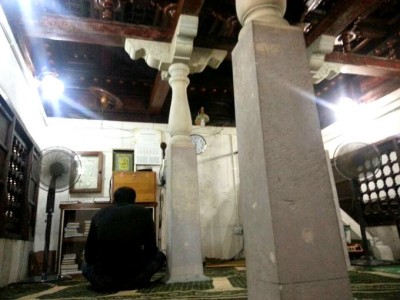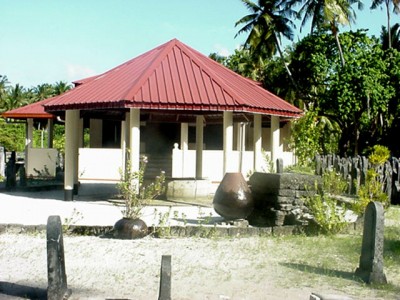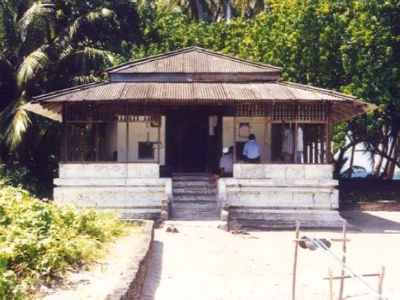The Department of Heritage has announced it will hold a special exhibition to raise public awareness of six coral stone mosques currently being considered for UNESCO world heritage site status.
“The purpose of hosting an exhibition for this theme is because recently 6 coral stone mosques of Maldives have been inscribed on the tentative list of world heritage sites and now we are trying to inscribe the mosques on the permanent list,” said the department’s Director Ali Waheed.
The exhibition for the mosques – two in Malé, and one in Ihavandhoo, Meedhoo, Isdhoo, and Fenfushi – will run between April 21 and April 30 at the National Museum.
“By arranging such an exhibition will give the opportunity to raise awareness among students and the public about this nomination,” said Waheed in a press release today.
Potential world heritage sites must be listed on the tentative list at least one year prior to their nomination for the full list.
Successful nominations must include meet at least one of UNESCO’s ten selection criteria. The coral mosques will be nominated as meeting four of the cultural criteria points, which include:
- sites that exhibit an important interchange of human values on developments in architecture
- sites that bear a unique or at least exceptional testimony to a cultural tradition
- sites considered to be outstanding examples of a type of building which illustrates a significant stage in human history
- sites which are directly or tangibly associated with events or living traditions, with ideas, or with beliefs, with artistic and literary works of outstanding universal significance
Waheed explained that further detailed evidence was needed before the final submission could be completed, in particular work to prove that the lacquer work exhibited in the mosques is unique to the Maldives.
Admission onto the world heritage site would bring the benefits of cultural tourism and maintenance funds to the sites.
The submission to UNESCO’s tentative list – made in February 2013 – described the mosques as a unique fusion of the Indian sub-continental, the Swahili, Malayan, and the Arab cultures.
“The ensemble of coral stone architecture and a building typology of such a representation of many maritime cultures of Indian Ocean are altogether unique, rare and cannot be found in any other part of the world,” read the submitted documents.
The submission explained that coral – taken from live boulder on the seabed – became the primary building material from the Maldives’ pre-Islamic era (prior to 1153) until the late 18th century.
Being further refined during the Islamic period, east African Swahili techniques were used to complement those of the Buddhist era, read the submission, which details the features of each mosque.
“These mosques as living mosques also embody the intangible and spiritual values of the communities and bear witness to the spread of Islam in the Indian Ocean region.”
Friday Mosque, Ihavandhoo, Haa Alifu atoll
Built during the reign of Sultan Ibrahim Muzhiruddin, the mosque remains in use today. The mosque’s cemetery contains the tombstones of many famous figures from the country’s history, including the independence hero Mohamed Thakurufaanu.
The mosque is described as being the finest example of a coral stone mosque with ‘Dhaala’ (verandah like antechambers). “The mosque has got great potential to be restored to its original state and regain its position as the best coral stone mosque in the north of Maldives,” read the submission.
Friday Mosque, Meedhoo, Raa atoll
Meedhoo’s Friday Mosque is believed to have been built under the reign of the first Sultan from Dhiyamigili Dynasty, Sultan Muzaffar Mohamed Imaduddin II around 1705. The mosque is unique as the only surviving example of clay roof tiling.
“The fact that the mosque is still being used by communities far away from the mosque proves the high ancestral values placed to this mosque by local communities,” commented the Department of Heritage.
Friday Mosque, Malé, Kaafu atoll
First submitted for heritage status in 1987, Malé’s friday mosque is considered the country’s most important heritage site. Built in 1658 during the reign of Sultan Ibrahim Iskandhar I on the site of the first mosque built after conversion, the mosque is considered to be the one of the finest coral stone buildings in the world.
“The architecture, construction and accompanying artistry of the mosque and its other structures represent the creative excellence and achievement of the Maldivian people,” the Heritage Department has said.
Eid Mosque, Malé, Kaafu atoll
The Eid Mosque was built during the time of Al-Sultan Mohamed Muinuddin in 1815, and rests on a highly decorated coral stone platform with carved coral stone walls and a timber roof structure.
“It is the last of the coral stone mosques and has the best ornamentation and craftsmanship of all the mosques in the country and is in good condition,” explained the department.
Friday Mosque, Fenfushi, Alifu Dhaalu atoll
Built between 1692-1701, during the reign of Sultan Mohamed of Dhevvadhu, the Fenfushi mosque features a unique coral stone bathing tank, coral stone wells, a sun-dial, and a large cemetery.
The designs on the steps to the pool suggest it had been built during the Buddhist era.
Isdhoo Old Mosque, Isdhoo, Laamu atoll
Dating from the reign of Sultan Ali VII in 1701, the coral mosque in Isdhoo is where the copper chronicles ‘Isdhoo Loamaafaanu’ (1195) – the oldest historical writings found in the Maldives – were once kept.
It is believed that the mosque was built from materials left over after the construction of Malé’s Friday Mosque.
“The existence of Isdhoo copper plate with much important historical written information, serves as a support for the authenticity of this mosque. Due to this historical significance for this mosque, the mosque is highly protected and valued,” said the department’s UNESCO submission.




